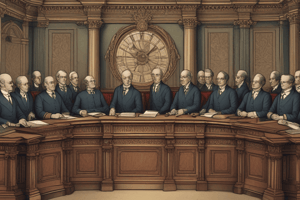Podcast
Questions and Answers
What is one of the main components of a democratic society?
What is one of the main components of a democratic society?
- Authoritarian rule
- Single-party system
- Multi-party system (correct)
- Monarchy
The principle of separation of authorities involves combining the legislative, executive, and judicial powers into one body.
The principle of separation of authorities involves combining the legislative, executive, and judicial powers into one body.
False (B)
What is the role of representatives in a parliament?
What is the role of representatives in a parliament?
To represent the interests of the citizens and participate in legislative processes.
A parliament is a representative body of the __________ authority.
A parliament is a representative body of the __________ authority.
Match the following bodies with their primary functions:
Match the following bodies with their primary functions:
Flashcards are hidden until you start studying
Study Notes
Parliament
- Parliament is composed of representatives elected through democratic processes in a multi-party system featuring freedom of political participation.
- Parliament exercises legislative authority, meaning it creates and enacts laws.
- The concept of separation of powers is a fundamental principle in democratic systems.
Separation of Powers
- The principle of separation of powers divides government functions into three branches: legislative, executive, and judicial.
- Each branch operates independently and has its own specific responsibilities.
- The legislative branch (Parliament) creates laws.
- The executive branch enforces laws.
- The judicial branch interprets laws.
Studying That Suits You
Use AI to generate personalized quizzes and flashcards to suit your learning preferences.




